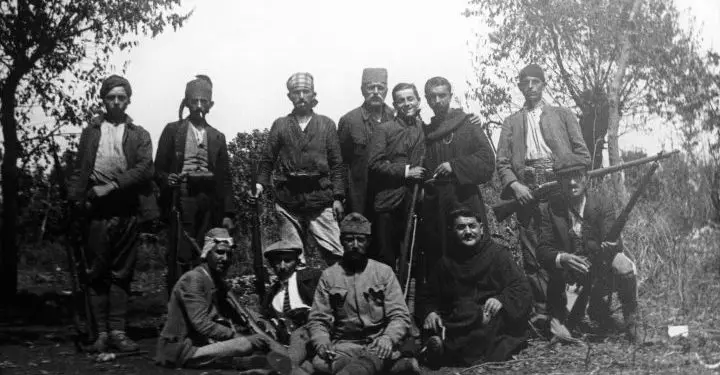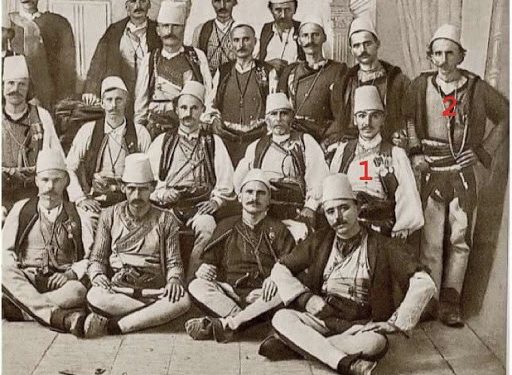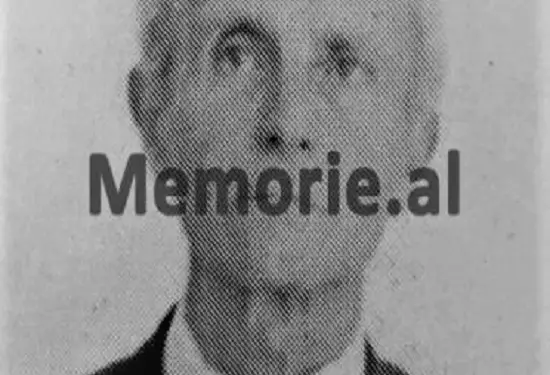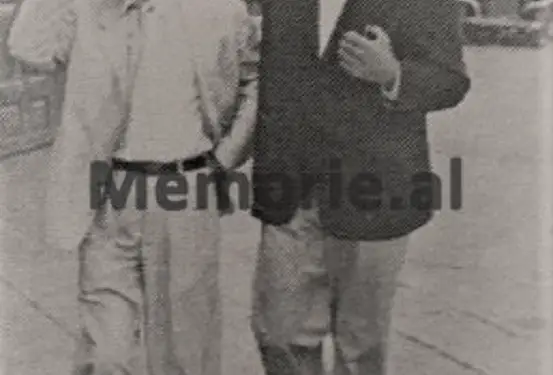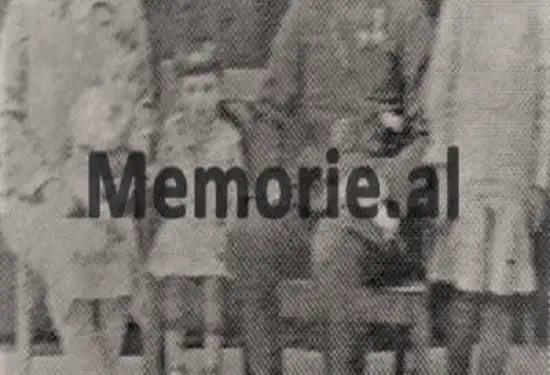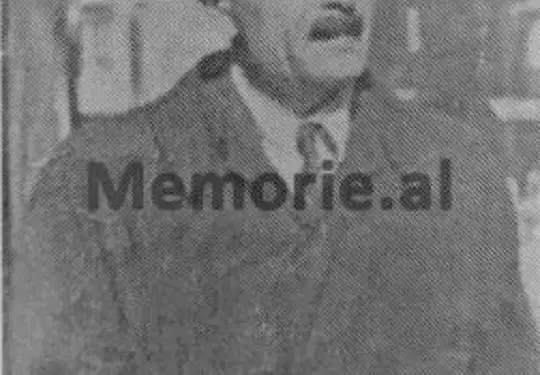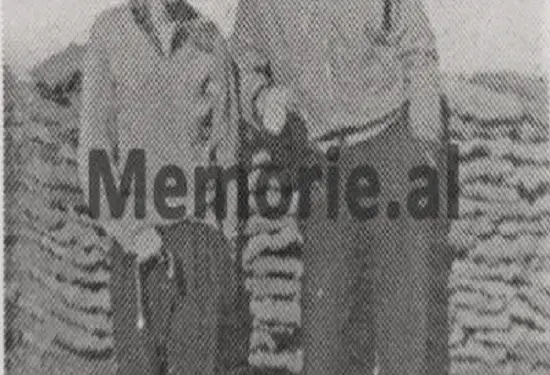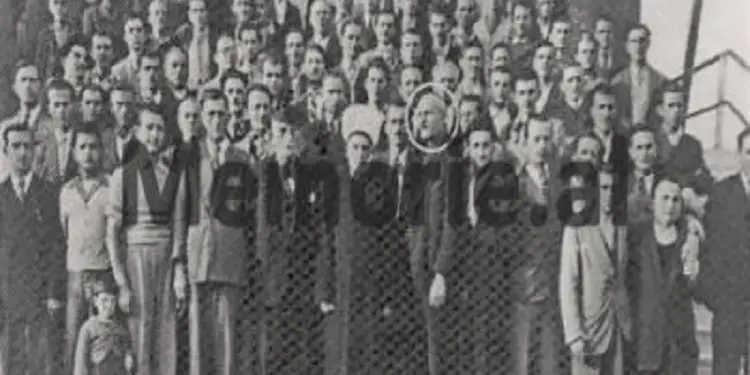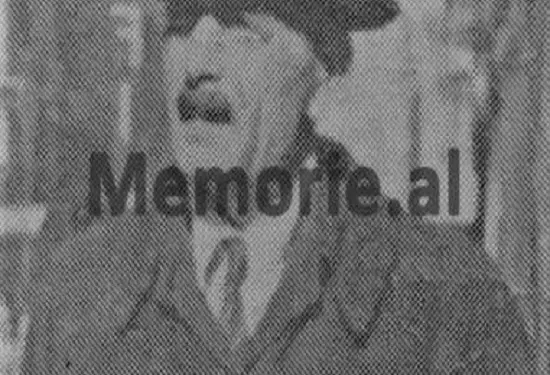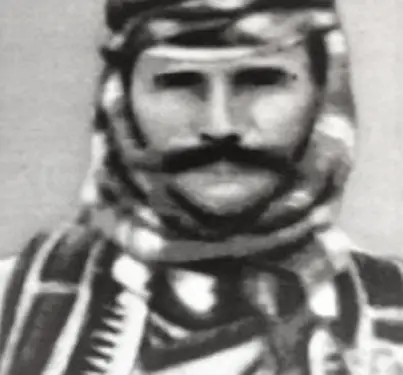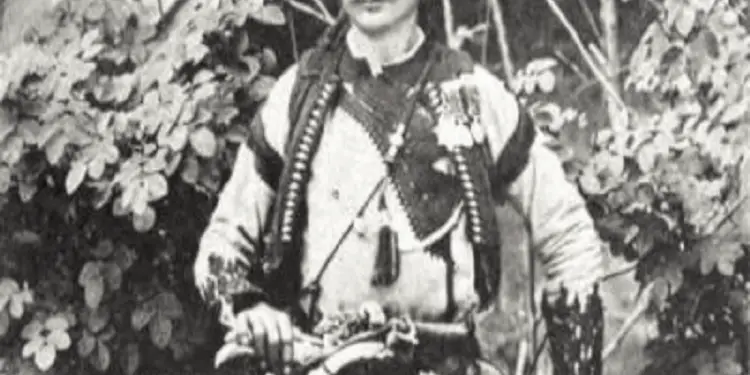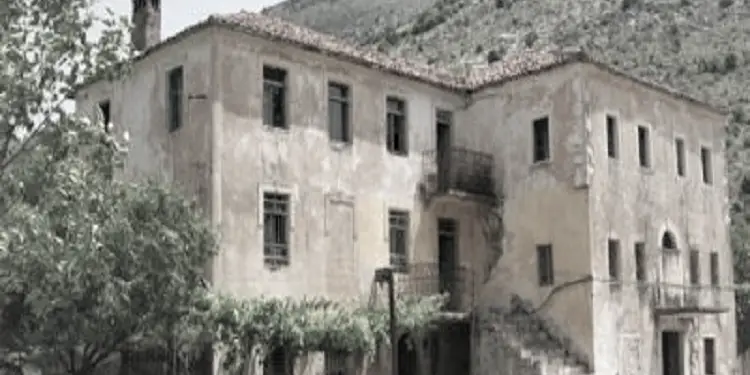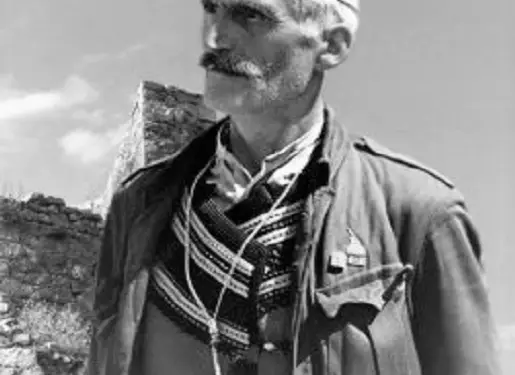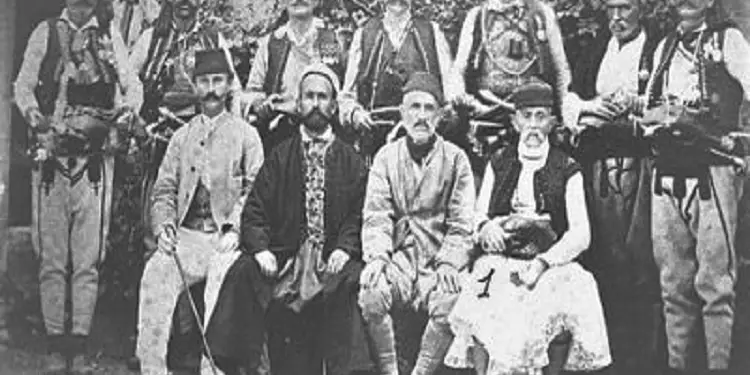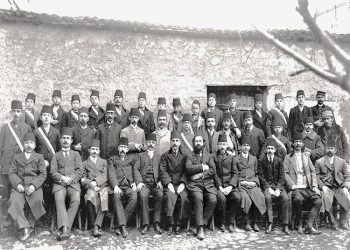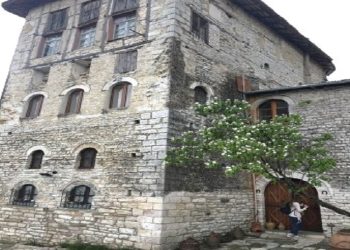Dashnor Kaloçi
Memorie.al publishes the unknown story of the large tribe of Bajraktars of Hoti and Malësia e Madhe, led by Çun Mulë, the only family of the Muslim faith in that area, who at the head of the highlanders of the Catholic faith, led the leadership fought against Ottoman and Serbo-Montenegrin forces, perpetuating themselves in a song that continues to be sung even today in those areas of Northern Albania. Testimony of Kastriot Bajraktar, the son of Mul Deliu and the grandson of Çun Mula, how the parish of Bajrak i Hotit was inherited by his grandfather, Deli Meta, and then by his father, the Monarchy officer, who after receiving Part of the suppression of the Mirdita Uprising in 1921 The envoy of the Minister of the Interior, Ahmet Zogu, in 1925 was again sent by Zogu to arrest Dom Loro Caka, the organizer of the Dukagjini Uprising which was funded by Belgrade. Mul Bajraktar’s brilliant military career during the Monarchy period and his arrest by the Italians after refusing to attack partisan and nationalist forces in the Rec war in ’43, as well as his arrest by German forces after he refused to fight alongside them, deporting him to extermination camps in Austria. Mul Deliu’s return to Italy in ’45, where with King Zog’s intervention he was released from the Reggio-Emilia camp and together with 30 former Monarchy soldiers left for Syria, joining the Syrian military. . His death in 1952, after rejecting the “offer” of the Yugoslav UDB Major Cedo Mijovic, to be put in charge of the Albanian anti-communist emigration, in order to land in Albania, as well as the suffering of his family his in internment camps in the villages of Myzeqe.
“On April 6, 1939, when the news broke that fascist Italy was invading Albania, King Zog summoned my father, Mul Bajraktar, who at the time held the rank of major, and appointed him commander of the military forces, for the defense of Vlora. But while Mul Bajraktari at the head of the armed forces was preparing to leave for the city of Vlora, the order was changed and the General Command of the National Defense, which had just been formed, appointed him Commander of the Battalion “Deja”, whose he was ordered to settle at the foot of the Shijak hills, where the second line of the defense region was. My father, Mul Bajraktari, at the head of the forces, was installed in the place where he stayed until the afternoon of April 7, where the Italian forces broke the resistance of the “Deja” Battalion, which was badly equipped and with soldiers mobilized on the 24th. the last hours. After the defeat of his battalion, the father, along with several other officers, returned to Tirana, where they were informed that the King and his Guard and part of the Guard had left for Korça. Testifies for Memorie.al, Kastriot Bajraktari, the eldest son of Lieutenant Colonel Mul Deli Bajraktari, who comes from the famous family of Bajraktars of Hoti and Malsi e Madhe, who for several centuries led the mountaineers of that province in their wars against Turkish forces and Serbia-Montenegro. What is the story of the family of Mul Bajraktar and who were the most famous suckers of that great tribe in Northern Albania? What were some of the battles and events related to the names of the men of that family and the efforts of the King of Montenegro and King Alexander to divert them from their path? Who were the descendants of Çun Mulë, who was sung by his father Gjergj Fishta in “Lahuta e Malcisë” and how the family of Lieutenant Colonel Mul Deli Bajraktari, the last sucker of this family, who inherited and kept Bajrak e Hotit of Malësia e Madhe .
The family of Çun Mulë, the leader of Hoti and Malësia e Madhe
One of those large families that has produced prominent men and has made a great name in the history of Albania, is the family of Çun Mulë, or as it is otherwise known “Bajraktari of Hoti and Malësia e Madhe”. Since the 15th century, this family has always been mentioned in the North of Albania, alongside the Zogolli families of Mati, Gjonmarkajve of Mirdita, Kaloshëve of Dibra and Mulosmanëve of Krasniqe. According to various legends and testimonies, the history of this family or more precisely of the tribe of Bajraktars of Hoti and Malësia e Madhe, is known for twelve generations and one of the first of its trunk was Luc Gjori. It is also said that this person was the one who won and took over the leadership of Bajrak of Hoti, which he later inherited and his tribe generation after generation, until the middle of the last century. Luc Gjori won the right to hold the Bajrak of Hoti and Malësia e Madhe, as he was known for his rare courage and bravery in the Bar War in Montenegro. Likewise, from the position of Bajraktar that was won by Luc Gjori, that family had the right to be represented at the head of the country, in the various assemblies held in Northern Albania and together with the tribe, to be as leaders (flag bearers) at the head of the wars that took place in that province and the surrounding areas. Based on the rights and obligations that Bajraktar’s post gave to his house, Luc Gjori created the “Great Highlands Covenant” to enable the protection of the province and its bajrak, from the difficult situations that were created from time to time. One of the first conditions that was set and accepted in that Covenant created by Luc Gjori, was the pledge to stop any murder, robbery or blood feud within the province, which was held by all the tribes of Bajrak i Hotit and of the whole of the Great Highlands. After Luc Gjori, one of the most famous figures of that family, was Çun Mula, who was born in 1818. Under customary law sanctioned in the Canon of Mountains, Chun Mula inherited the Bajrak principality that his family had and was placed at the head of the mountaineers, leading them with bravery and loyalty to the many wars that took place in that province against Serbo-Montenegrin and Turkish forces.
Cun Mula, heir of Bajraktar of Hoti
It also turns out that Chun Mula took part in the Ottoman Empire’s wars in Crimea and Morea. Based on the great name that Çun Mula created in that province, in 1878, the parish of Hoti and Malësia e Madhe, elected her as its representative in the Assembly of the League of Prizren that was held on June 10 of that year, under the presidency of Iljaz Pasha Dibra (Qoku). In this assembly, Çun Mulë was also assigned the function of the commander of the military volunteer forces, for the whole of Malësia e Madhe. One of the biggest battles led by Chun Mula, where he was known for his rare courage and bravery, was the battle of Zharnica, where he, with the volunteer mountaineers he commanded, badly defeated the regular military forces of Krajl Nikolla of Montenegro. . Similarly, a few years later, Chun Mula fought again against the military forces of the Ottoman Empire, when it came out openly in favor of Montenegro, for the release of Hoti, Gruda, Plava and Gucia. One of the most famous battles fought by Çun Mula against the Turkish forces is the one in Bajza i Kastratit, against the military forces of Bedri Pasha. During that battle, Chun Mula sought the support of Captain Hodo Beg Sokoli, who was the military commander of Northern Albania, based in Shkodra, and he supplied him with numerous weapons for the volunteer forces that Chun Mula gathered in Postriba, Shkrel and Kastrat. . It is said that the commander of the Turkish forces, Bedri Pasha, finding it impossible to clash with the mountaineers led by Bajraktar of Hoti, who were determined to fight at all costs to protect their lands, avoided armed struggle and paved the way for Chun Mula.
The oath developed by Cun Mula which was immortalized in the song
This event at that time caused a great commotion, so much so that it was immortalized in the songs and folklore of folklore, being sung with lahuta by several generations. In one of those songs, among other things, it is said: “Where is Çun Mula going / From Kelmendi today I sat down / I noticed that my street was busy / I was busy with the wholesale road / From Kastrati to Kamica”. Padre Gjergj Fishta is also inspired by those songs sung by the mountaineers of that region, who in his major work, “Lahuta e Malcisë”, among others, writes: “Çun Çun Mula is coming, Mark Lula / Njeni i Hot is coming. and the other of Shala / Tough for rifles and wise for words ”. In addition to his activity as a military leader at the head of the mountaineers, Bajraktari of Hoti Çun Mula, was known and respected as a wise man in reconciling bloodshed or dividing various courts, not only in his province but also in the North and Albania. Çun Mula is also known for his contribution to the reconciliation between the parish of Lezha and the bayraktars of Mirdita, in their constant quarrels over the demarcation of the borders between the two provinces. At that time, when those quarrels between the two provinces were very heated, the captain of Mirdita, Gjon Markagjoni, with the consent of the Bajraktars of Lezha, called Çun Mulë, who divided the borders, leaving both sides satisfied. It is said that the borders where Çun Mula planted the stones, continue to be the borders that divide the two provinces of Lezha and Mirdita. Chun Mula died in 1896 at the age of 76 and was buried with honors in the lands of his ancestors in the province of Hoti.
Deli Meta, a follower of Çun Mulë at the head of Bajrak i Hotit
After the death of Chun Mula, one of the prominent men of that family was his nephew, Deli Meta, who was born in 1857. Like the first members of his family, Deli Meta spent most of his life. turned it into a war against the Serbo-Montenegrin forces. From numerous testimonies, it is said that Deli Meta became the horror of the Serbo-Montenegrins, from the bravery he showed in the War of the Town, the Sub-Poisons of Grabanic. Also one of the famous battles where Deli Meta stood out, was that of Koplik in 1912, against the Serbo-Montenegrin forces, which sought to annex Shkodra, Montenegro. Along with Deli Meta, his son Mul Bajraktari, as well as Luc Nishi, who was from Dedë Gjon Luli’s tribe, also fought in these battles. After that battle, in retaliation, Montenegrin forces burned Deli Meta’s house three times in Hot, and three times Krajl Nikolla of Montenegro, together with King Alexander, asked him to open the way for you in exchange for gold and ranks, which was categorically rejected by Bajraktari of Hoti and Malësia e Madhe. After Serbia and Montenegro annexed half of the province of Hoti, Gruda and Tuz, Krajl Nikolla of Montenegro sent his Foreign Minister to persuade Deli Meta and Hoti’s leadership to sign a statement, part of which Hoti’s remaining to join Montenegro. For this, the Minister of Krajl Nikolla proposed to Deli Meta a large amount of gold, as well as high ranks, but Deli Meta together with Hoti’s leadership, rejected with disgust the proposal of the Montenegrin Minister. It is said that during a party held at the Krajl Nikolla Palace, where the most prominent Montenegrin officers were invited, Krajli asked them who the most dangerous Albanian leaders were, presenting them with serious problems. After many different responses from Montenegrin officers, who gave their opinions, Krajl Nikolla addressed the audience, saying: “I am afraid of two people: Bajraktar of Hoti, Deli Meta who is a Muslim and governs a Catholic province. and Bajraktar of Gruda, which is Catholic and governs a Muslim province. “Because in the event of a conflict, they both have the whole nation with them.” With the arrival of Austro-Hungarian troops in 1916, Deli Meta along with his son, Mul Bajraktar, and 150 other men from Hoti and Malësia e Madhe were interned in Ashah Dynave (near Vienna) where they were held until in 1918, when World War I ended. After the fascist invasion of Albania, the Italian consul, Meloni, twice proposed to Deli Meta to build the burnt towers in Hot and give him a large sum of money, in exchange for pursuing his pro-Italian policy in that province. But Deli Meta categorically rejected the proposal, and after that, the Italian authorities deported him to the villages of Berat, even though he was 92 years old at the time. Deli Meta, who died in 1945 and had left the legacy of Bajrak i Hotit for years, to his son Mul Bajraktar, who was educated in Austria and during the period of the occupation of Albania, held the rank of lieutenant colonel.
Who was Mul Bajraktari?
Mul Bajraktari was born in 1894 in the province of Hoti and he was the second of three sons of Deli Meta, who inherited the principality of Bajraktar of Hoti and Malësia e Madhe. Mul Delia or otherwise known as Mul Bajraktari, spent his childhood there in the lands of his ancestors and received his first lessons in the city of Shkodra, where his family had a great friendship with most of the country’s nobility. Regarding the past of Mul Bajraktar, his son Kastrioti testified: “At the beginning of 1916, when Muli was not more than 22 years old, together with his father, and at the same time, my grandfather, Deli Meta and Another 150 mountaineers from the Great Highlands were exiled by Austro-Hungarians to a camp near Vienna called Ashah Dynave. In that place they remained until the end of the First World War in 1918, when they were released and returned to Albania. In 1919-’20, Mul Bajraktari took part in the Koplik War, together with the vulgar forces of Malësia e Madhe, led by his father, Deli Met Bajraktari, and during that battle, his closest friend Luc was killed. Nishi. My father, Mul Bajraktari, also took part in the Kakarriq War against the Serbo-Montenegrin forces, which invaded the northwestern borders of Albania. In 1921, when the separatist revolt of Mirdita broke out, alongside government forces commanded by Major Preng Jaku, who were sent to suppress it, by order of the Minister of the Interior, Ahmet Zogu, my father, Mul Bajraktari, also took part. volunteer forces launched from the Great Highlands. An Austrian colonel was also seriously wounded during the fighting. When Mirdita’s captain, Gjon Markagjoni asked for a meeting with Mul Bajraktar and said: ‘Although we are in opposite positions, having the highest considerations for the tribe and the door of your family, I am handing over this colonel in your trust, to escort me to the Archbishopric and Shkodra. Muli trusted the Austrian colonel and escorted him to the Archdiocese of Shkodra, from where he was sent to Vienna. For this honor which he bestowed on the Austrian colonel, before leaving Albania, he handed Muli, in memory, his sword, which our family had kept until it was raided by partisan forces. A few years later, in 1925, after the Dukagjini Uprising was suppressed, the head of state, Ahmet Zogu, instructed our father, Muli, to go to the White Crown to capture Dom Loro Caka, who was considered one of the organizers. leading to that revolt. According to the order he received from Zogu, the father went to the Dukagjini area, where after collecting her boss, he was told that he had gone there to arrest Dom Loro Caka, because the government had accurate information that he was staying there. Although he had received the order from Zog, his father did not want to arrest him and spoke to the owner of the house where Dom Loro Caka was staying, telling him to remove him from there, as he was wanted by the government and someone else would come. to arrest. When he returned to Tirana, Zog called Muli to the Palace and said: ‘Bajraktar, tell me the truth, why didn’t you arrest Dom Loro Caka’ ?! Muli replied, “I did not arrest him, because I saw fit that Dom Lora Caka should live, and you, the High One, would have no harm in doing so.” After these words of his father, Zogu replied: “I have nothing to do with you, Bajraktar, because I have a friend”, Kastriot Bajraktari remembers the meeting of his father Muli, with Zogu, after the mission that he had assigned to the capture of Dom Loro Caka, the organizer of the Dukagjini Uprising of 1925, which was said to have been funded by Belgrade for the overthrow of Zog.
Mul Bajraktar’s military career
After 1925, when Ahmet Zogu ordered the Ministry of Interior to take action to disarm the hottest areas of Albania, in the province of Dukagjini he sent Mul Bajraktar who with his very good behavior, performed that task successfully and without any incident with residents of those areas. After that mission, Mul Bajraktar’s military career began a rapid ascent, about which his son, Kastrioti, stated: “In 1927 Zogu transferred Muli to the Gjirokastra district, appointing him to the Royal Border Guard. A year later, being in that position, Muli was appointed as the representative of the Albanian side in the Commission that was set up at that time for the regulation of the Southern Border of Albania with Greece. After completing that task in 1929, Muli came to Tirana to attend the Royal Border Guard course, which he completed in 1930 under the guidance of Italian instructors. After completing this two-year course, Zogu appointed Muli as the Commander of the 3rd Battalion of the Royal Border Guard, in the area of Pogradec and Korça. From 1930 until 1937, when his father served in the area, he worked with exemplary correctness and with his initiative, set up the Leskovik barracks, as well as some taps along the border, which served not only the soldiers who were there. but also the inhabitants of those border villages. In 1935, while Muli was traveling on horseback for an inspection in the border area he was covering, he was the target of a Yugoslav-organized assassination, slightly injuring his arm. The assassins were caught and the court sought to sentence them severely, but with Muli’s intervention, they were only sentenced to three years each. The father intervened for their light sentence, because it was plotted by the Albanian secretary of the Yugoslav Legation in Tirana (Z.P.), who was later arrested. For that exemplary work he did in the area of Pogradec and Korça, Muli was decorated several times by King Zog and was given the rank of first captain “, Kastriot Bajraktari recalled, regarding the military career of his father Muli.
April 7, 1939, fights in Shijak
After a successful military career of Mul Bajraktar, from the beginning of 1938, King Zog transferred him to the city of Durrës, with the duty of Commander of the Naval Port, where he worked until the beginning of 1939, when he was assigned to pursue the training course for officers in Tirana, which would be led by French instructor Andrea De Leo. Regarding this, Kastriot Bajraktari testifies: “Muli failed to complete the training course for officers that opened in Tirana at the beginning of 1939, because it was closed by the military aggression that Italy undertook against Albania. On the morning of April 6, 1939, Mul Bajraktar was assigned the task of commanding the military and reserve forces for the defense of Vlora. But as he was getting ready to head to Vlora at the head of the commanding forces, the newly formed General Command of National Defense changed the order and charged him with the duty of Commander of the “Deja” Battalion, to which he was assigned. charged with combat duty to be stationed in the Shijak Hills, where the second defense region was located. According to the order given by the superior command, my father, Mul Bajraktari, with the military forces he commanded, was installed in the Shijak Hills, where he stayed until the afternoon of April 7, where the numerous Italian forces that landed in Durrës traveled in the direction of Tirana, breaking the resistance of the “Deja” Battalion, which was badly equipped by the armed forces and with soldiers recruited only in the last 24 hours. After the defeat of that battalion, the father, together with some other soldiers, left in the direction of Tirana and from there in the direction of Korça, where the convoy of vehicles accompanying King Zog and a part of the Royal Court had started “, Kastriot recalled. Bajraktari, regarding the fascist aggression of April 7, 1939.
Protects Albanian lands in Montenegro
On April 9, 1939, when King Zog’s Court Minister issued a statement stating that: all Monarchy officers and officers should return to their former positions, Mul Bajraktari and many other officers returned to Tirana. At that time, the General Command of the Albanian National Army appointed Muli as the Commander of the Financial Guard in the city of Durrës. Regarding this, Kastriot Bajraktari says: “Although he was assigned to that task, the SIM bodies launched an investigation against him, describing him as one of the officers who had opposed the military landing in Durrës with weapons. As he entered the lists of those to be interned, who had gone to Rome for approval, he was ordered to transfer to Saranda, where he had been appointed company commander. The father was forced to accept that task, because at that time, his father and our grandfather, Deli Met Bajraktari, who was 84 years old, had been interned by the fascist authorities in the villages of Berat. After three months, Mulin was summoned to Tirana, where he was released from military service. At that time, forced by economic need, as his father was in charge of a family of nine, he became involved in trade. During this time he was offered the rank of major in Milici, but he refused. He also rejected the post of Prefect in Kosovo and the position of Corporate Adviser. As early as 1942, he came into contact with anti-fascist individuals and, together with them, undertook to organize a Malësia movement against the invading Italian forces. As part of this movement at the time, he had constant contact with the Archbishop of Shkodra, Monsignor Gaspër Thaçi and Father Anton Harapi. As early as 1943, Tito’s Chetnik and partisan forces had been organized into regular military formations and had approached the northern borders of Albania, with the aim of retaking Ulcinj, Tivar, Hoti, Tuz and Gruda. Malësia e Madhe, given the Bihar Massacre, where 5,000 Albanians were massacred, was alarmed and, in order not to repeat it, decided to defend itself. At the meeting that was organized in Malësia e Madhe for this, Mul Bajraktari was appointed as its chairman and there was chosen a delegation of 50 people, who under the leadership of Muli, would come to Tirana to look for weapons. After an organization organized by Mul Bajraktari, the Italian authorities gave him 2,500 weapons for Malësia e Madhe and another 500, they gave them to Prenk Cali, for the protection of Kelmendi. At the time when Muli took up arms and organized the volunteer forces of Malësia e Madhe, the nationalist and partisan national liberation groups had gathered in the Reç-Lohje-Rrjoll area. Italian authorities twice ordered Muli to attack the forces, but he refused. While Muli was in Tuz, he ordered his forces not to fight in the Rec area against partisans and nationalists, where the Italians had sent them by force. As a result of the rejection of the forces commanded by Muli, the Italians suffered defeat at Rec, where they left 25 dead and 50 wounded. In retaliation for this loss, Colonel Clementi arrested Mulin and held him for 20 days in the Distrello prison.
He was interned by the Germans
After the capitulation of Italy, although Mul Bajraktari held the position of Commander of the Northern Border with the rank of lieutenant colonel, he worked closely with the English missions in the North to organize resistance against the German forces. Regarding the activity of Mul Bajraktar at that time, his son Kastrioti says: “Knowing the influence of Muli throughout Malësia, the German commander of Gestapo, Major Husding, who was in Shkodra, proposed to him that at the head of a force of 2500 volunteer forces, to carry out an operation in Vlora and Korça, but Muli categorically refused. He was also summoned to Tirana, where he was offered the post of commander of the German “Operation Winter”, which he again refused. Following this, on April 27, 1944, German Major Hofman Husding issued an arrest warrant for Mulin, who was first sent to Prizren and then to the Pristina camp to serve his sentence. After three months in Pristina, Mulin was sent to the Kerstoplatz camp in Vienna, Austria, where he was released only with the intervention of Anglo-American and Soviet allied forces. He then went to Italy, where he remained in the Reggio-Emilia camp until 1947. At that time, with the intervention of King Zog, along with 35 other former soldiers, he was released from there and went to Syria, where he the whole group of officers joined the Syrian army, but with the ranks they had in Albania. In 1949, along with other soldiers, they were demobilized from military service, and at that time he was in a very bad economic situation. In 1951, Yugoslav Intelligence Chief Cedo Mijovic proposed to Muli that he go to Yugoslavia and deal with the organization of anti-communist immigration, so that he could intervene militarily in Albania. After consulting with King Zog, Muli responded with the following words: “With the weapons and the ranks of Yugoslavia, I cannot attack my homeland Albania.” My father, Mul Bajraktari, died in Damascus, Syria, in 1952, and only after the fall of the communist dictatorship, in 1994, with the help of the Albanian-American diaspora, his remains were brought home and have been buried there ever since. in Hot, at the graves of our ancestors “, Kastriot Bajraktari, Muli’s eldest son, ended his story, who together with his brother Melek, and four sisters Lirien, Bukurien, Tefta and Drita, suffered for many years in exile. in the camps of Myzeqe. Their deportation came after the communist regime of Enver Hoxha, their father, Mul Deli Bajraktari, declared him an “enemy of the people” even though his photograph and name are still on the parcel of former German camp inmates Kerstoplatz. near Vienna./Memorie.al




